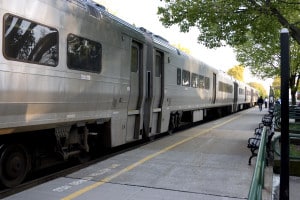The long-delayed plan to extend the Massachusetts Bay Transportation Authority’s Green Line cannot proceed without significant cost reductions, state transportation officials agreed Wednesday, while again refusing to rule out the possibility of scrapping the project altogether.
“There is a lot of work to be done before we can move on a project that is affordable and fiscally responsible,” Massachusetts Transportation Secretary Stephanie Pollack told reporters following a joint public meeting of the MassDOT board and the fiscal control board recently created to oversee the cash-strapped Boston transit system.
No final decisions were made, but Pollack said, “We can’t take full cancellation off the table.”
The control board did impose a 90-day moratorium on any design or contracting decisions by MBTA staff while the future of the multibillion project is decided. It calls for a 4.7-mile extension of above-ground light rail service through Somerville and into Medford, ending near Tufts University. Six new MBTA stations would be constructed and the existing Lechmere station would be relocated.
Backers say the project would deliver a major economic boost to a densely populated area that has become increasingly popular with young professionals and college students but has few mass transit options.
The extension was among several transit proposals the state committed to in 1990 as part of a settlement that helped clear the way for the Big Dig, which would become the nation’s largest and most expensive urban highway project.
The Green Line extension finally appeared back on track in January, when the federal government committed nearly $1 billion to a then-projected $2.3 billion price tag. But MBTA officials later revealed new cost estimates that pegged the state’s share to be as much as $1 billion higher than expected.
Berkeley Research Group, a consulting firm hired by the control board to determine why the estimate suddenly spiked, delivered a report last month that sharply criticized how T officials managed a new procurement process used in negotiations with White Skanska Kiewit, the project’s lead contractors.
The board heard from other consultants Wednesday, including the law firm Nossaman. The firm recommended that the MBTA dump the current open-ended contracts and take new bids for a single design-build contract for the remainder of the project, with a fixed price and guaranteed completion date.
Another consultant, John Karn from the Arup Group, outlined a series of potential design changes that could trim between 10 percent and 40 percent of construction costs, including the elimination of a branch to Union Square in Somerville and scaling back the size of the new stations and a maintenance facility.
Officials said scrapping the project would cost the state nearly $1 billion in promised federal funds, along with the loss of up to $742 million in state funds already spent or committed, including for the purchase of new Green Line cars to run on the track.
Somerville Mayor Joseph Curtatone was among several local officials who urged state officials to find a way to move forward with the project.
“Let’s build this thing,” Curtatone said. “Because if we can’t build it, what can we build in this commonwealth?”







